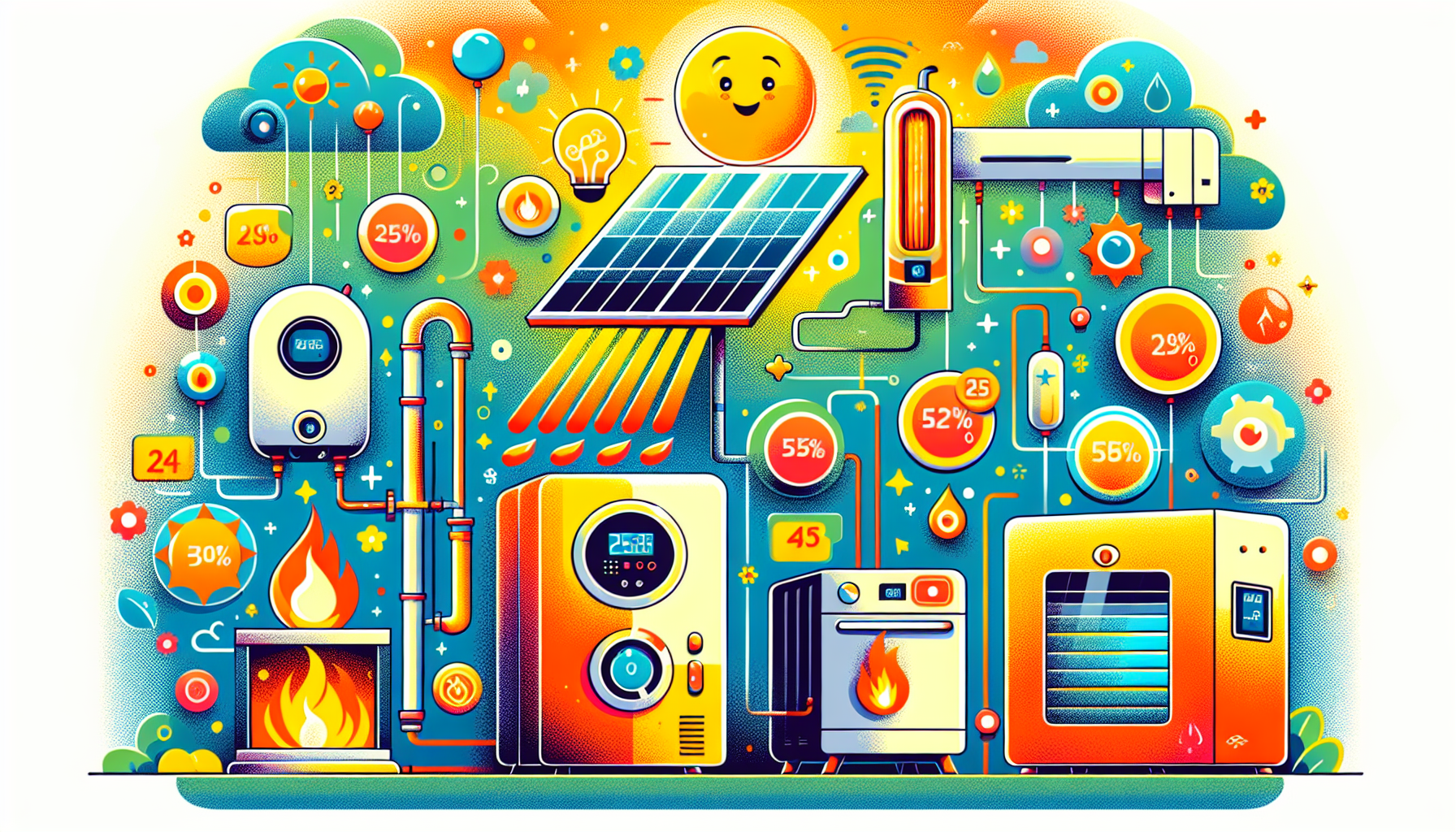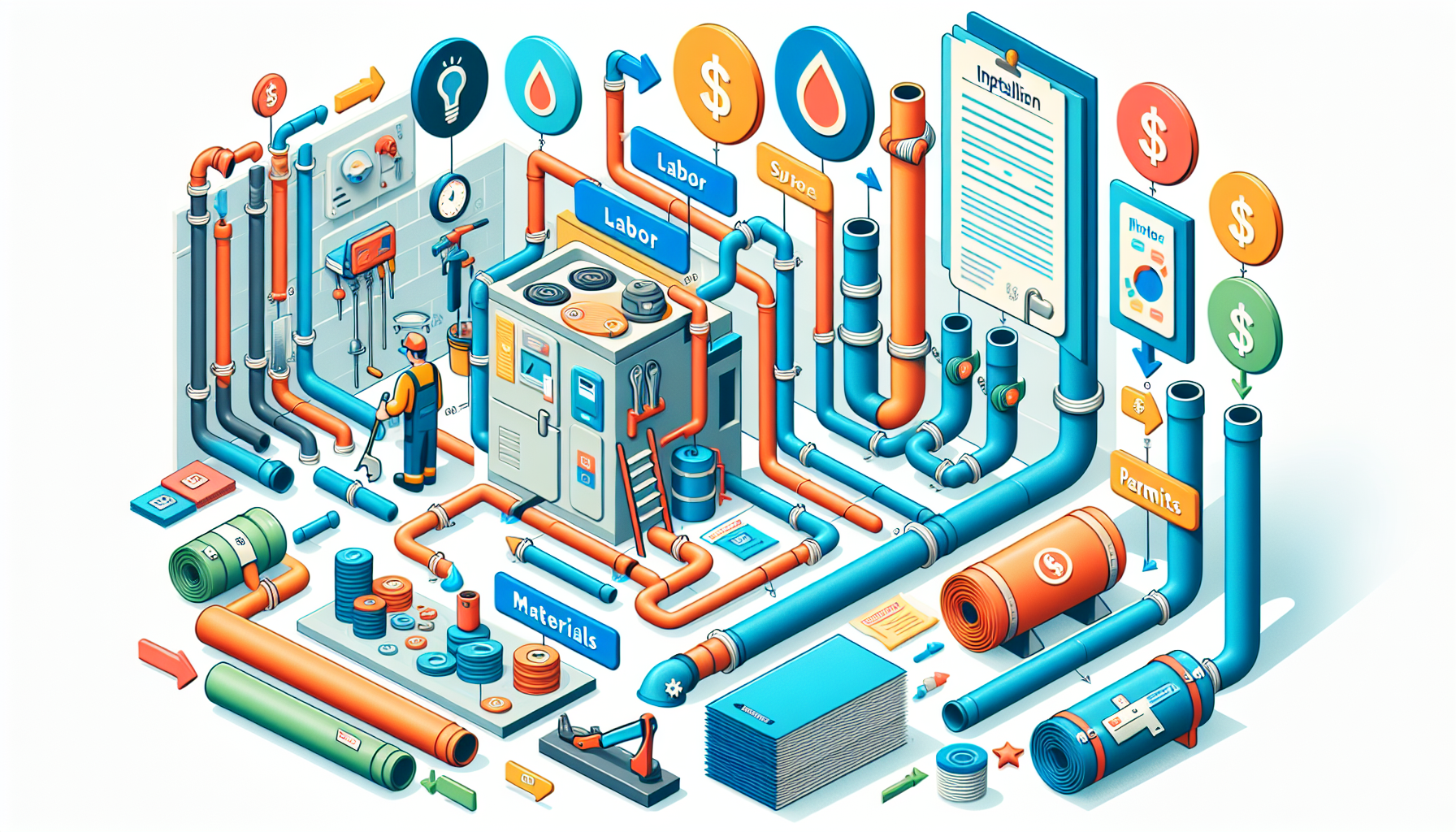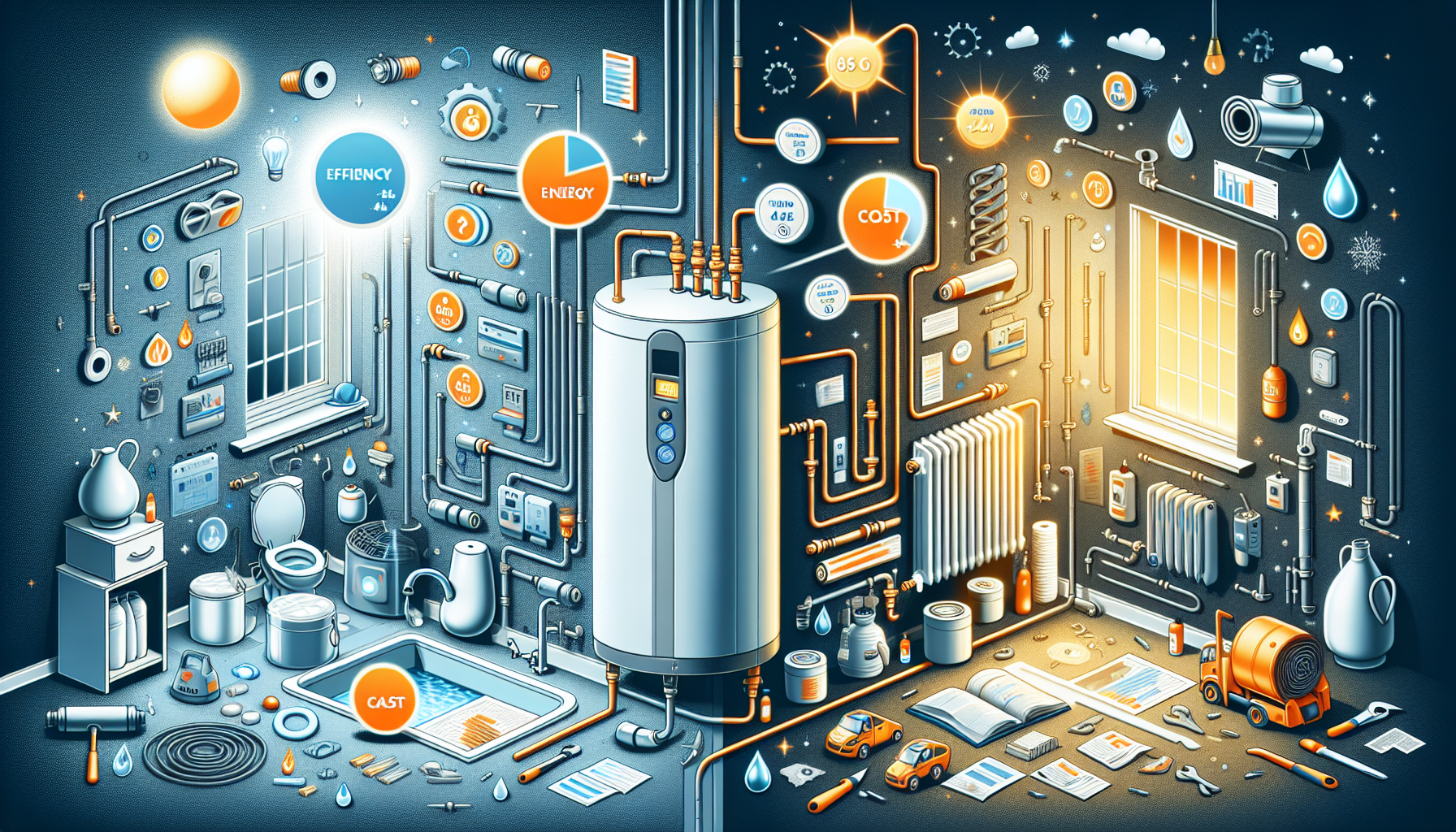Hot Water System Pricing: Installation and Maintenance Costs Explained
Curious about hot water system pricing? This guide breaks down the costs of storage tanks, continuous flow, heat pumps, and solar systems. Learn about purchase prices, installation expenses, and running costs to help you make an informed decision.
Key Takeaways
-
There are various types of hot water systems, including storage tank, continuous flow, heat pump, and solar, each with unique costs and benefits tailored to different needs.
-
Installation costs for hot water systems can range from $1,000 to $7,000, influenced by type, complexity, and regional factors, with maintenance playing a crucial role in long-term expenses.
-
Choosing the right hot water system involves assessing household needs, comparing initial and ongoing costs, and considering energy efficiency and available government incentives for savings.
Types of Hot Water Systems and Their Costs

When it comes to hot water systems, the market offers various options tailored to different needs and budgets. The main types of systems include storage tank systems, continuous flow systems, heat pump systems, and solar hot water systems. Each type has its unique features, advantages, and cost implications.
Storage Tank Systems
Storage tank systems are the most traditional type of hot water system. They involve an insulated tank that continuously heats water, ensuring that hot water is available whenever needed. These systems can be powered by electricity or gas, with materials like stainless steel, vitreous enamel, and copper commonly used for the tanks. The heating elements are usually made from copper or nickel-chrome alloy, making them a reliable choice for an existing hot water system.
One of the benefits of storage tank systems is their ability to store a large volume of hot water, making them suitable for households with high hot water usage. These systems can be installed indoors or outdoors, providing flexibility depending on your home’s layout.
However, they tend to have higher energy consumption compared to continuous flow systems due to the need to keep water hot at all times.
Continuous Flow Systems
Continuous flow systems, also known as tankless systems, heat water on demand as it flows through a heat exchanger, ensuring an unlimited supply of hot water. These systems are more energy-efficient than storage tank systems because they do not retain heated water, thus avoiding the energy loss associated with storage tanks.
Gas-powered continuous flow systems typically range in cost from $750 to $1900, depending on the model and installation requirements. A notable advantage is their compact size, as they can be wall-mounted, making them ideal for homes with limited space.
However, they may experience a slight delay in delivering hot water, especially when multiple outlets are in use.
Heat Pump Systems
Heat pump systems are an energy-efficient alternative for heating water. These systems use electric split systems to transfer heat from the air or ground to heat water, which makes them highly efficient. Split heat pump systems are generally quieter and require less maintenance compared to other types of hot water systems.
The initial cost of heat pump systems can be higher than traditional electric or gas systems, but their energy efficiency can lead to significant savings on energy bills over time. Households seeking sustainable and cost-effective options should consider heat pump systems.
Installation Costs Breakdown

Understanding the installation costs of hot water systems is crucial for effective financial planning. Installation costs can range from $1,000 to $7,000, depending on the type of system and regional factors like labor availability and local market competition.
When planning, factor in the purchase price along with installation and future maintenance costs.
Electric Hot Water System Installation Costs
Electric hot water systems are typically the most affordable option, with prices ranging from $300 to $1,500. The installation process is relatively simple and straightforward, usually costing between $1,000 and $2,000, including materials and labor. This makes them an attractive option for homeowners looking to minimize upfront costs.
These systems can be installed both indoors and outdoors, offering flexibility in placement. Materials like stainless steel, vitreous enamel, and copper are commonly used for the storage tanks, ensuring durability and efficient performance.
Gas Hot Water System Installation Costs
Gas hot water systems offer a balanced approach to initial installation costs and ongoing operational expenses. The installation costs for gas hot water systems can range from $1,500 to $3,000, depending on the complexity of the installation and whether a natural gas connection is already available.
Several factors can influence the final pricing, including local regulations, the need for additional setup, and the efficiency of the system. For households with an existing gas connection, the costs can be more competitive, making gas systems a viable option for many homeowners.
Solar Hot Water System Installation Costs
Solar hot water systems are known for their higher installation costs, typically ranging from $3,000 to $7,000. These costs can increase if a backup system is needed to ensure hot water availability during cloudy weather.
Despite the higher initial investment, solar systems can offer significant savings in the long run through reduced energy bills and potential government rebates. They are an excellent choice for eco-conscious homeowners looking to reduce their carbon footprint while enjoying reliable hot water service.
Ongoing Maintenance and Running Costs
Maintaining your hot water system and understanding its running costs are vital to managing your household budget effectively. Annual energy costs can vary significantly depending on the type of system and usage patterns.
Investing in regular maintenance and energy-efficient practices can help reduce these costs over time.
Electric Hot Water System Running Costs
Electric hot water systems generally have higher running costs due to electricity prices, with estimated annual energy costs ranging from $700 to $925. These systems typically have a poor running cost rating compared to other types.
Regular servicing is recommended at least once a year to ensure efficiency and reliability. Implementing smart controls, timers, and water-saving habits can significantly help reduce the running costs associated with electric hot water systems.
Gas Hot Water System Running Costs
Gas hot water systems are generally more cost-effective to run compared to electric systems, with estimated annual energy costs ranging from $295 to $665. Continuous flow systems, in particular, heat water on demand, leading to less energy use and increased efficiency.
The lifespan of gas hot water systems with tank storage is typically 8-12 years, which can influence long-term running costs.
Solar Hot Water System Running Costs
Solar hot water systems are known for their lower maintenance needs and quieter operation compared to other types. Regular maintenance is essential to ensure efficient operation and safety.
These systems typically last up to 10 years, providing reliable service over time and contributing to significant savings on energy bills.
Factors Influencing Hot Water System Pricing

Several factors can influence the pricing of hot water systems, including household hot water usage, energy efficiency ratings, and government incentives. Understanding these factors can help you make an informed decision and potentially save money in the long run.
Household's Hot Water Usage
Household size is a crucial factor influencing the amount of hot water usage in a home. Larger households typically require more extensive hot water systems to meet higher usage demands.
Several factors affect the choice of hot water systems, including installation costs and ongoing maintenance expenses along with the household’s hot water usage.
Energy Efficiency and Ratings
The energy efficiency of a water heater is quantified through its energy factor (EF), with higher EF ratings indicating greater efficiency. Choosing energy-efficient models can lead to significant long-term savings through lower utility bills. Electric heat-pump water heaters can enhance solar energy self-consumption, benefiting both economically and environmentally.
Solar water heating systems are recognized for their high energy efficiency and minimal environmental footprint. Selecting energy-efficient systems can substantially decrease the environmental footprint compared to conventional systems.
Government Incentives and Rebates
Incentives for energy-efficient systems may include tax credits or subsidies, significantly lowering initial costs and making these systems more affordable. Government incentives and rebates are available to help reduce the costs associated with installing hot water systems.
Considering these incentives when planning for a new hot water system can lead to substantial savings.
Choosing the Right Hot Water System for Your Home

Choosing the right hot water system involves evaluating your household’s specific needs, comparing initial and long-term costs, and considering the environmental impact of the best hot water system.
This section will guide you through the decision-making process, ensuring you select the most suitable system for your home.
Evaluating Your Needs
Understanding household size and water usage can guide the selection of the most suitable hot water system. The number of individuals in a household significantly influences hot water requirements, suggesting at least 4 liters per person daily. Sizing water heaters based on household size is crucial; larger families require bigger storage tanks.
Usage patterns, such as peak times for hot water use, are vital in determining the appropriate system size.
Comparing Initial and Long-Term Costs
When choosing a hot water system, it’s crucial to compare initial costs against potential long-term savings to make an informed decision. Solar hot water systems have lower running costs over time, despite higher initial purchase and installation expenses. Electric heat pump systems can provide lower long-term energy costs despite potentially higher initial expenses.
Tankless hot water systems, while pricier upfront, can lead to lower ongoing expenses due to their on-demand heating capability.
Considering Environmental Impact
Selecting a hot water system with consideration for environmental impact contributes to sustainability and energy efficiency. Gas-boosted solar hot water, electric heat pump, and solar-electric-boosted systems have the least environmental impact.
Weighing environmental considerations alongside financial implications ensures a well-rounded decision for home heating solutions.
Financial Planning for Hot Water System Installation

Effective financial planning is essential for managing the costs associated with installing a new hot water system. This section covers budgeting strategies, available financing options, and tips for maximizing savings.
Budgeting for Upfront Costs
Budgeting for the upfront costs of a hot water system involves obtaining quotes from different suppliers to ensure you get the best price. It’s important to consider not just the purchase price, but also the installation costs, which can vary significantly depending on the type of system and the complexity of the installation.
Creating a detailed budget that includes all potential expenses, such as installation fees, necessary upgrades, and potential maintenance costs, helps avoid unexpected financial strain. This proactive approach ensures you are financially prepared for the investment.
Financing Options
Manufacturers often offer special financing programs to assist with the purchase of hot water systems, making it easier for homeowners to manage the costs. These programs can significantly alleviate the initial investment burden, allowing you to pay for the system in manageable installments.
Some financing programs offer low or no interest rates, enabling homeowners to spread the payments over several years while minimizing upfront costs. Exploring these options can make the investment in a new hot water system more accessible and affordable.
Maximizing Savings
To maximize savings, consider utilizing off-peak electricity tariffs to reduce the running costs of electric hot water systems. Additionally, taking advantage of government incentives and rebates can further decrease the financial burden.
Adopting energy-efficient practices, such as installing smart controls and timers, can also help lower energy usage and reduce bills. By combining these strategies, you can make your hot water system investment more cost-effective in the long run.
Summary
Understanding the costs associated with hot water systems, from installation to ongoing maintenance, is crucial for making an informed decision. By evaluating different types of systems, their costs, and the factors influencing pricing, you can choose the right hot water system for your home.
Investing in a hot water system that meets your household’s needs, offers energy efficiency, and aligns with your budget can ensure reliable hot water service for years to come. Remember to explore available financial incentives and rebates to maximize your savings. Taking the time to plan and make informed choices will pay off in the long run.
Frequently Asked Questions
What are the main types of hot water systems?
The main types of hot water systems are storage tank systems, continuous flow systems, heat pump systems, and solar hot water systems. Each type has its own benefits, so consider your needs when choosing!
How do installation costs vary for different hot water systems?
Installation costs for hot water systems can range from $1,000 to $7,000, depending on the system type and factors like labor costs and complexity. So, it's a good idea to consider these factors when budgeting for your installation.
What factors should I consider when choosing a hot water system?
When choosing a hot water system, think about the type of system, your household size, and how much hot water you typically use. Don't forget to factor in energy efficiency, installation costs, and any available government incentives.
Are there financial incentives for installing energy-efficient hot water systems?
Absolutely, there are government incentives and rebates that can significantly lower the costs of installing energy-efficient hot water systems. It's worth checking out what’s available in your area!
How can I reduce the running costs of my hot water system?
You can cut down on your hot water system costs by using energy-efficient practices, smart controls, and scheduling usage during off-peak electricity times. These simple changes can lead to significant savings!




























